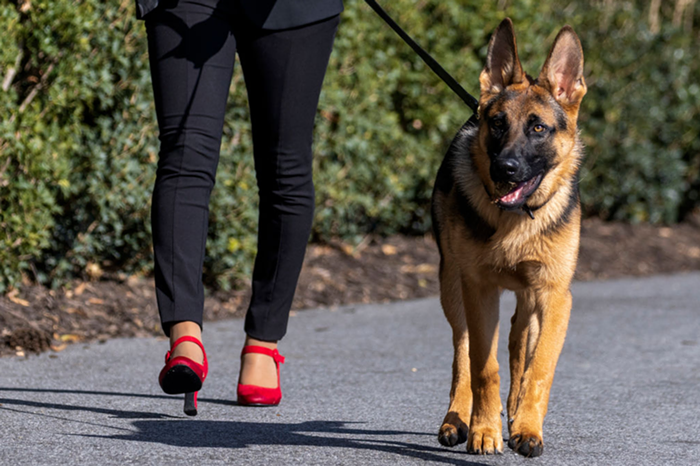March 8: This story has been updated to note the revised service model at the Veterans Memorial Coliseum.
The Oregon Liquor and Cannabis Commission (OLCC) is monitoring potential compliance issues at the Moda Center connected to self-service alcohol sales.
Levy Restaurants, a national restaurant group, has been the food, beverage, and retail partner for the Rose Quarter for years, responsible for dining services during Portland Trail Blazers games and other events.
This year, Levy worked with Amazon to introduce Amazon’s Just Walk Out technology at four stores in the Moda Center. Just Walk Out uses a self-service kiosk stocked with items.
The technology, which is also in use at other professional sports venues like Seattle’s Lumen Field, uses artificial intelligence to ascertain which products fans select and automatically charges their cards or Amazon accounts—saving fans the trouble of standing in line to check out with a cashier. Similar technology has also been added at Veterans Memorial Coliseum, though it's recently been updated to no longer use a self-service method.
It can, depending on how people feel about Amazon and artificial intelligence, save fans time in the arena. The issue? The Moda Center self-service stores currently allow for fans to purchase alcohol, but self-service for alcohol is not legal at OLCC licensed establishments.
According to Matt Van Sickle, public information officer with the OLCC, the commission was alerted to a potential compliance issue at the Moda Center earlier this season and “has been working with Levy Restaurants to bring them into compliance.”
“The nature of our enforcement is largely complain[t] driven,” Van Sickle wrote in an email to the Mercury. “And when we encounter a license that’s out of compliance, our first approach is to work with them and help educate them on how to get back into compliance. What happened here with the Moda Center is a perfect example of that.”
A spokesperson for Levy, which handles dining services at a number of other NBA arenas, confirmed that the company has been in contact with the OLCC this season regarding the self-service stores.
“We worked with [the] Oregon Liquor and Cannabis Commission to establish protocols for safe and responsible service at these new locations, which includes checking IDs and opening cans and bottles before guests leave the market,” a spokesperson for Levy wrote in an email to the Mercury.
By checking identifications, assessing whether a customer is intoxicated or not, and opening the cans and bottles for patrons, the self-service stores can comply with OLCC regulations.
But that process, one employee said, still creates challenges for Levy workers in charge of the stores.
“Customers don’t want to comply [with the checkout process], they resist, they don’t want our dirty hands on their beer,” the employee, who asked not to be named due to fear of retribution, said. “But the OLCC rule is there’s no self-service—and the law states that it’s on us, we’re licensed OLCC servers.”
The employee said the mismatch between customer expectations regarding the self-service stores and OLCC requirements has left employees trying to handle sometimes aggressive customers with little support.
“This big corporation Levy… and the Portland Trail Blazers have these sales systems which are incompatible, and they’re putting employees in a really bad position—it’s like, fight with the customer or violate your OLCC requirements,” the employee said.
Part of the issue, the employee alleged, is that Levy management started the season “totally unaware” that self-service for alcohol is illegal in Oregon. Levy operates in numerous states, some of which have different laws regarding the provision of self-service alcohol than Oregon does.
After they were made aware of the compliance issues with the new stores, the employee said management began asking employees to open bottles and cans for customers but hasn’t provided the infrastructural support to ensure that workers can enforce the rules, stay safe, and maintain control of their stations. At crowded events, that can be a serious challenge.
Levy management also, the employee said, threatened to retaliate against them for complaining about the situation in December.
“The whole experience has made me not like basketball anymore, to be honest with you,” the employee said. “I’ve stopped being a Trail Blazers fan over my experience working at the stadium.”
The Levy spokesperson said the corporation enjoys a strong relationship with the OLCC, but did not address questions about whether the company has received complaints from employees about the self-service set-up or if it has counseled employees on how to deal with aggressive customers.
“Over the course of the season, OLCC has been on-site several times to ensure guests and team members understand how this new experience works,” the Levy spokesperson wrote. “We have a positive relationship with OLCC and appreciate their continued partnership to make the food and beverage experience at Moda Center enjoyable, convenient, and safe.”
Van Sickle, for his part, promised OLCC would be back at the Moda Center in the coming months.
“We’re going to return to verify they are in compliance,” he wrote. “If it’s discovered they are still allowing self-service, we will act either to bring them into compliance or issue violation notices.”




















